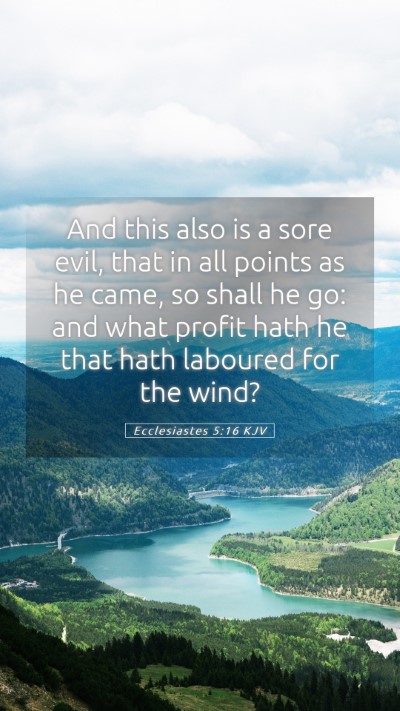Understanding Ecclesiastes 5:16
Ecclesiastes 5:16 states: “And this also is a sore evil, that in all points as he came, so shall he go: and what profit hath he that hath labored for the wind?” This verse offers a profound reflection on the fleeting nature of life and the futility of pursuing wealth and material possessions.
Bible Verse Meanings and Interpretations
This verse is considered by many to encapsulate the essence of the book of Ecclesiastes, which emphasizes the vanity of earthly pursuits. The interpretations provided by various commentators offer insights into its theological and practical applications:
- Matthew Henry: Henry emphasizes the inevitability of death and the idea that one's life ends as it begins, highlighting that human efforts often yield no lasting value. He reflects on the sorrow that comes from recognizing that all labor is ultimately in vain when one cannot carry the fruits of their work beyond the grave.
- Albert Barnes: Barnes elaborates on the concept of “laboring for the wind,” suggesting that many strive for things that have no real substance or enduring significance. He argues that seeking worldly success can lead to emptiness, as one cannot take material gains with them after death.
- Adam Clarke: Clarke points to the broader context of human existence, noting that the vanity of life is a consistent theme in Ecclesiastes. He suggests that the pursuit of riches and status can lead to anxiety and dissatisfaction, reminding readers to focus on spiritual fulfillment rather than temporal gains.
Scripture Analysis and Biblical Exegesis
This verse is part of a larger discourse on the nature of life's pursuits. Its stark reminder of mortality serves as a wake-up call for individuals to evaluate their priorities. The analysis of Ecclesiastes 5:16 raises several key points:
- Vanity of Life: The phrase “as he came, so shall he go” portrays the human experience as inherently transient. This sobering observation encourages believers to consider what truly matters in the grand scheme of life.
- The Futility of Earthly Gains: The metaphor of “laboring for the wind” illustrates the pointlessness of accumulating wealth that cannot provide lasting satisfaction or meaning. It challenges readers to think critically about their aspirations and the societal values they chase.
- Spiritual Reflection: Ecclesiastes prompts readers to shift their focus from worldly ambitions to spiritual wellness. The fleeting nature of material wealth stands in contrast to the eternal value of spiritual pursuits, such as faith, love, and community.
Applying Ecclesiastes 5:16 to Daily Life
In the context of everyday living, Ecclesiastes 5:16 has several practical applications:
- Prioritizing Values: Individuals are encouraged to place greater emphasis on spiritual growth and relationships instead of solely pursuing financial success. This verse serves as a reminder that true contentment comes from within and is rooted in faith.
- Finding Fulfillment: Understanding that material wealth can lead to a life devoid of meaning encourages believers to seek fulfillment in activities that enrich their lives, such as volunteering, engaging in community service, or nurturing family ties.
- Reflecting on Legacy: The consideration of one’s legacy becomes critical when confronted with the reality of mortality. This encourages introspective questions about how one wants to be remembered and what impact they want to leave behind.
Related Bible Verses and Cross References
Ecclesiastes 5:16 resonates with several other passages that explore similar themes of vanity and the human experience:
- Ecclesiastes 1:2: "Vanity of vanities, saith the Preacher, vanity of vanities; all is vanity."
- 1 Timothy 6:7: "For we brought nothing into this world, and it is certain we can carry nothing out."
- Matthew 6:19-21: "Lay not up for yourselves treasures upon earth, where moth and rust doth corrupt, and where thieves break through and steal: But lay up for yourselves treasures in heaven..."
Conclusion
Ecclesiastes 5:16 serves as a crucial reminder of life's impermanence and the inherent value of spiritual pursuits over material wealth. The insights offered by public domain commentaries enrich our understanding of this passage, prompting us to reflect on our priorities and the legacy we wish to leave. For those engaged in Bible study groups or using Bible study tools, this verse provides a rich foundation for discussion regarding the meaning of life, fulfillment, and the nature of success.


